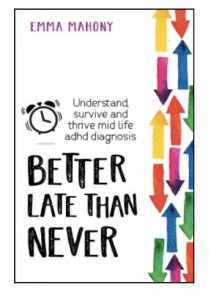
The British ADHD organization – ADDISS – ran a campaign a few years ago in ADHD awareness week (this year happening on October 14 ) called “ADHD IS real”. I can’t think of many Awareness weeks that have to focus on the fact that the condition they are campaigning about actually exists.
Few mental health issues seem to suffer from the same stigma as ADHD. When I asked the head of the UK ADDISS, Andrea Bilbow OBE, to explain to me why I could only find well-funded parenting groups for Autism and Aspergers in my area, and nothing for ADHD, she explained: “Autism has the Aaahh factor, people feel sorry for the sufferers or carers. ADHD is just seen as annoying”.
And ADHDers can be annoying, and are often easy to blame because they make a lot of mistakes, forget things, and can be over-talkative and impulsive. They are quick to be fingered as a culprit when something goes wrong, or to become scapegoats at school, family or society. When Author Kevin Roberts was asked at the International ADHD conference in Liverpool in 2013 what it felt like to have ADHD, he answered that it felt like a giant finger pointing at his forehead saying “You’re Wrong!”.
And you will wonder along the way, whether you are wrong – or have made the whole thing up. Whether your child is the way they are because you are a bad parent, or if you are toying with seeking an adult diagnosis, whether you yourself could just “try harder”.
Many readers of the Daily Mail believe that the explosion in child diagnoses in this county is just a namby-pamby politically correct way of covering up for rubbish parenting, or that the kids are out of control because their parents don’t know how to set firm boundaries. They don’t see that it is to do with a better understanding of mental health issues.
What is relevant if you have a child with it, or have it yourself, or live with someone who has it, is that it is real for you. It is real for the estimated 25% of the prison population in the US who has undiagnosed ADHD[1], as estimated by Dr Ned Hallowell, a US psychiatrist and expert on the condition. It serves some people to believe that ADHD isn’t real because that way they don’t have to ask themselves whether it is right to lock up 25% of prisoners who might have otherwise chosen a different path after diagnosis and treatment.
Unlike other spectrum disorders, like Bipolar or autism, that don’t get challenged in the same way, ADHD is often given a moral spin. The moral pronouncements of what is Good and Bad, what is Right and Wrong, are hardwired into our culture. It’s as if we need someone to blame to feel better about ourselves. It sits with the black and white view that bad people get locked up and good people don’t.
So assuming you are touched by this condition in some way, choose to look at it not as a plague or disease – as the NY Times suggest – but as a mental health issue that is unusual because it can be treated with medication.
One of the best things about ADHD is that there is plenty that can be done, more so perhaps than with other spectrum disorders. From medication to meditation, from exercise to exercising your creativity, from checklists to coaching, there are many, many ways of keeping the difficulties in check and the positives brimming over. ADHDers can be the movers, shakers and dream makers, the game changers, the one-offs, the originals, the people who think outside of the box, see the world from a different angle, the supporters of the underdogs. Without them, there’d be fewer actors, entrepreneurs, stand-up comedians, DJs, musicians, racing car drivers, or artists.
As Kevin Roberts writes in his book: Movers, Shakers, and Dream Makers, unlocking the power of ADHD: “We have to be careful that we don’t put creative people into the straight-jackets of conformity. We live in a world that, in many ways, teeters on the brink of disaster. The creativity so common among ADHDers is something the planet desperately needs.”[2]
[1] Page XV of the introduction, Driven to Distraction
[2] page 119. of Kevin Roberts book, Movers, Shakers and Risk Takers, unlocking the power of ADHD

